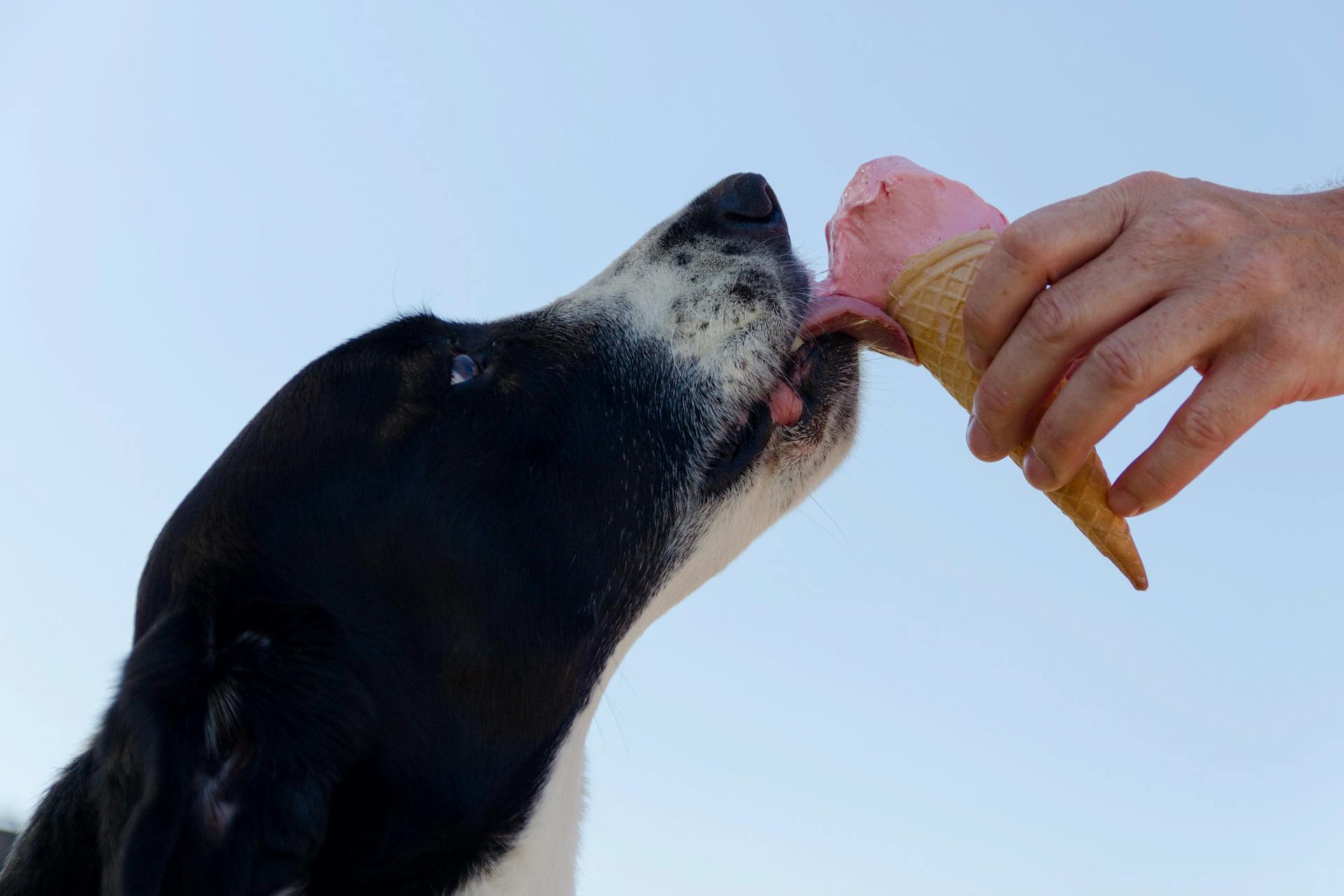
So, you've noticed your furry friend's breath has taken on a fishy odor. This unpleasant smell is often a sign that your dog's teeth and gums need some attention.
Bad breath in dogs can be caused by a buildup of bacteria in the mouth, which can lead to a fishy smell. This is especially true if your dog has periodontal disease.
Dogs with poor oral health are more likely to develop bad breath, so regular dental care is crucial. Brushing your dog's teeth daily can help prevent this issue.
In severe cases, the fishy odor can be a sign of a more serious health issue, such as kidney disease.
You might enjoy: Soft Food for Dogs with No Teeth
The Nose Knows: Unraveling the Mystery
Dogs have a natural odor, just like humans do, but a strong, persistent fishy odor is not typical and may indicate an issue that needs attention.
This smell can vary from dog to dog and may change due to factors like breed, diet, and overall health.
If your dog's breath smells more like a fish market than fresh morning dew, it's not just about an unpleasant aroma; it can indicate underlying health issues.
Understanding a dog's dental health is pivotal to deciphering the mystery behind that fishy smell.
Dental disease is a common culprit behind fishy breath, with an estimated 80% of dogs having some degree of periodontal disease by the age of two years.
Poor oral hygiene and food stuck in their teeth can also contribute to bad breath.
If your pup's breath smells fishy, there could be a few things going on, including dental disease, poor oral hygiene, or suffering from certain diseases or other illnesses.
Here are some potential causes of fishy breath in dogs:
- Food stuck in their teeth
- Poor oral hygiene
- Certain diseases or other illnesses
If you've been diligent with your dog's oral care, and their breath still smells like someone opened a can of tuna, you'll need to make a vet visit.
A simple oral care routine can't fix serious illnesses like diabetes, kidney disease, tumors, or upset stomach that can cause fishy breath.
These issues are typically accompanied by mouth pain, bleeding gums, vomiting, and weight loss.
You might enjoy: Dog Health Care
Causes of Bad Breath
Bad breath in dogs can be caused by a variety of factors, but the most common culprit is dental disease. This is because 80% of dogs have some degree of periodontal disease by the age of two years.
A dog's oral hygiene is crucial to preventing dental disease, and regular brushing can help keep teeth clean and breath fresh. However, even the best-trained dog can't be responsible for their own oral health, and regular brushing may not be enough to combat bacteria in the mouth.
Food stuck in teeth can also cause bad breath, and poor oral hygiene can lead to periodontal disease. Certain diseases or illnesses, such as diabetes, kidney disease, tumors, and upset stomach, can also cause fishy breath.
Here are some common causes of bad breath in dogs:
- Food stuck in teeth
- Poor oral hygiene
- Certain diseases or illnesses
If your dog's breath smells fishy, it's essential to have their teeth checked by a vet to rule out any underlying health issues. Regular dental cleanings can help prevent periodontal disease and keep your dog's breath fresh.
Diet and Its Impact
Dog breath can be a real issue, and a fishy odor can be especially unpleasant. Some dog foods or treats have fish as a primary ingredient, and residues can stick around causing a fishy scent.
If your dog's diet is high in fish, it could be the culprit behind the smell. Maybe reduce the fish content if it's a primary cause.
High-quality dog foods with balanced ingredients can help improve your dog's overall health and odor. Your veterinarian can recommend appropriate dietary changes to get your dog smelling fresh again.
You might like: My Female Dog Stinks like Fish
At-Home Oral Hygiene
Dog breath can be a real stinker, can't it? Poor dental health in dogs can lead to more serious health problems like heart disease or infections.
You can't just ignore the issue and hope it goes away. Establish a dental care routine for your dog, including brushing their teeth regularly and providing dental chews or toys.
After your dog's veterinary dental cleaning, their mouth will be fresh and pain-free. From there, you can (and should) take steps to maintain your dog's good oral health.
Curious to learn more? Check out: Dog Dental Health Month
Here are some at-home dental care ideas:
- Brush your dog's teeth with a canine enzymatic toothpaste at least three times per week. You should not use human toothpaste on dogs.
- Offer your dog dental treats or chews. Your veterinarian's office should have specific options that they recommend.
- Consider water additives that help prevent the buildup of plaque.
- Feed your dog a specifically formulated dental diet like Hill's Prescription Diet t/d Dental Care, Purina Pro Plan Veterinary Diets DH Dental Health, or Royal Canin Dental Care.
- Ask your veterinarian at each wellness visit if they recommend a dental cleaning this year. It is best not to wait until your dog's mouth is stinky and obviously diseased.
- Choose safe chew toys for your dog to prevent fractured teeth.
Regular dry dog food doesn't scrape the tartar off teeth effectively, so you'll want to stick with a dental diet.
Preventing and Addressing Odors
Dogs have a natural odor, but a strong, persistent fishy smell is not typical and may indicate an issue that needs attention.
A significant percentage of dogs develop periodontal disease by the age of two years, which can cause fishy breath. This is a common culprit behind fishy dog breath.
Regular oral care is crucial to prevent bad breath, but for some pet parents, brushing teeth can be a challenge. If this is the case, taking trips to a dog care specialist can be a good option.
Anal gland issues are a common problem behind fishy-smelling pups. Keeping your dog clean and healthy can help prevent anal gland problems.
Here are some tips to help prevent and address odors:
- Brush your dog's teeth regularly to prevent plaque accumulation and gum inflammation.
- Keep your dog's anal glands clean and healthy by expressing them regularly or having a dog care specialist handle it.
- Consult with a veterinarian if your dog's bad breath persists or is accompanied by other symptoms such as skin infections or vaginitis.
- Be aware of the potential risks of neglected oral health, including heart issues, liver problems, and kidney damage.
By following these tips and being proactive about your dog's oral health, you can help prevent and address odors and keep your furry friend happy and healthy.
Health Issues
Dental issues are a common cause of fishy breath in dogs. Plaque, tartar, and gum diseases can lead to a fishy odor, just like in humans.
Regular dental cleanings are essential to keep your dog's teeth and gums healthy. Professional dental cleanings can remove plaque and tartar accumulation that can't be removed with just dental treats alone.
Dental disease is a major contributor to bad breath in dogs. Most of the time, it's caused by plaque and tartar buildup, which can lead to bleeding gums, bad breath, and tooth loss.
Some common symptoms of oral cancer in dogs include excessive drooling, blood coming from the mouth, oral pain, loose teeth, visible masses in the mouth, and difficulty chewing or drinking.
Oral tumors can produce a strong, unpleasant odor, often compared to rotten meat. If you notice any of these warning signs, get your dog to the vet immediately.
Here are some common health issues that can cause fishy breath in dogs:
- Skin issues and infections, such as yeast infections or bacterial infections, can cause a fishy odor.
- Anal gland infections can also produce a strong, fishy smell.
- Oral tumors can produce a bad odor, often compared to rotten meat.
If you suspect your dog has one of these health issues, it's essential to take them to the vet for proper diagnosis and treatment.
Frequently Asked Questions
Why does my dog give off a fishy smell?
Dogs may give off a fishy smell due to anal gland secretions, dental disease, or infections such as UTIs or yeast infections. Discover the potential causes and solutions to help your furry friend feel fresh and clean again
What does a dog's breath smell like with kidney failure?
Bad breath smelling like feces or urine in dogs may be a sign of kidney issues, which can be a serious health concern
Sources
- https://cooperandgracie.com/en-us/blogs/infos/my-dogs-breath-smells-like-fish
- https://berthoudanimalhospital.com/dog-smells-fishy/
- https://toegrips.com/why-does-my-dog-smell-like-fish/
- https://centralbrowardvet.com/blog/dog-bad-breath/
- https://www.scenthound.com/dogblog/why-your-dog-smells-like-fish-and-what-to-do-about-it
Featured Images: pexels.com


